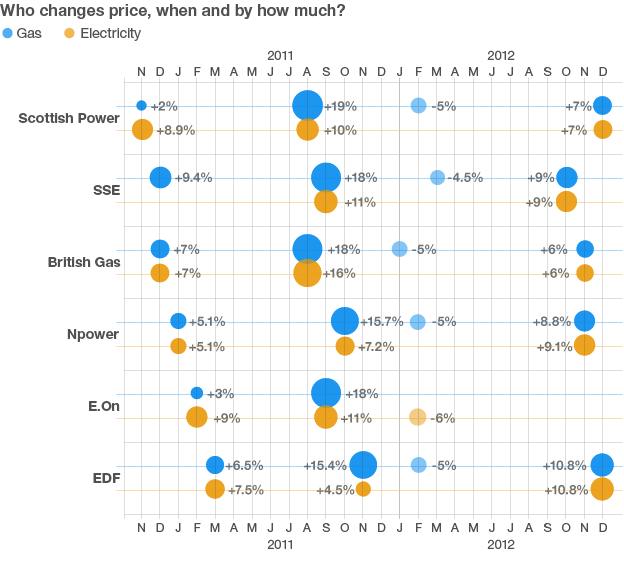Ed Davey announces 'four core tariff' plan
- Published
- comments
Ed Davey: ''Energy companies are hiding behind very complex, confusing, multiple tariffs and we going to get rid of that''
Energy companies will be able to offer only four tariffs each for gas and electricity under government plans to get customers a better deal on energy.
The government says it wants customers placed on the cheapest available price by summer 2014 at the latest.
However, ministers admitted they could not guarantee all households would see their energy bills cut.
Business and consumer groups warned the plans could mean some of the cheapest tariffs on offer disappear.
Labour welcomed plans to make tariffs simpler, but said the government also needed to reform the energy market and create a new watchdog to force companies to pass on price cuts.
The proposals, which are expected to be included in the forthcoming Energy Bill, have been put out for consultation until January.
'Bamboozled '
They include forcing energy firms to offer just four core tariffs for both gas and electricity - a fixed price for a fixed term and a standard variable rate, with two others based on different criteria such as payment method or whether renewable energy was a factor.
Energy suppliers would have to offer one price for each of the four tariffs, although they could still have discounts for dual fuel or lower cost payment methods such as direct debit.
Customers on "poor value" out-of-date tariffs, who are paying a higher rate than their supplier's cheapest standard tariff, will be switched to the cheaper rate.
Energy Secretary Ed Davey said households will be given personalised information from their supplier on their bills about the cheapest tariff the supplier offers for their payment method and the cheapest tariff overall.
'Out-of-date'
Mr Davey told BBC News he couldn't guarantee all customers would see their bills cut, but the majority of people would benefit and it would be "easier" to get lower bills.
Addressing MPs later, Mr Davey said a lot of people were on out-of-date tariffs and "bringing them down is going to save some of those people, indeed some of the most vulnerable, money and that is the right thing to do".
The move would boost customer switching, he added: "Because there will be fewer tariffs and they will be simpler, it will make it a lot easier for people to compare and will actually help competition."
The government said it was building on recent proposals by the energy regulator Ofgem, which has been looking into pricing for some time.
Ofgem welcomed the move and said the proposals "will put an end to consumers being bamboozled by complex tariffs and deliver choice that consumers easily understand".
Currently most people buy their gas and electricity from just six big suppliers, although there are smaller suppliers, amid a vast selection of tariffs.
Renewable targets
The structure of the charges can vary depending on payment method (by direct debit, pre-payment meter, or credit transfer such as cheque), on whether it is an internet-only tariff, which part of the country the customer lives in, if the deal involves a fixed price, when the deal was launched, how long it lasts, and so on.
Christine McGourty, Energy UK: "Companies have already taken steps to simplify tariffs."
Business and consumer groups warned the plans could mean energy users paying more.
Adam Scorer, director of policy at Consumer Focus, said it was a "sensible move" but there was "a risk of unintended consequences and in particular a general levelling up of prices".
And the Institute of Directors said restricting choice would simply allow energy companies to increase their lowest tariff, ensuring a higher minimum price for consumers.
"Instead, the government should be promoting competition and making it easier for new companies to enter the energy market."
Angela Knight, chief executive of Energy UK, which represents the major suppliers, said any fall in energy bills could be limited because about half a bill is made up of costs other than energy - such as upgrading infrastructure, insulating homes and environmental levies.
Shadow climate change secretary Caroline Flint said: "The cheapest energy deal in an uncompetitive market will still not be a good deal. Unless the government really reforms the energy market, there's nothing to stop the energy companies just putting up the prices of all their tariffs.
"The time has come for a complete overhaul of our energy market."

- Published20 November 2012
- Published20 November 2012
- Published12 October 2012